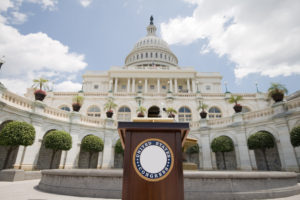
President Trump delivers State of the Union, D.C. Circuit upholds CFPB’s structure, and more…
IN THE NEWS
- President Donald Trump delivered his first State of the Union address. In the address, President Trump said that his Administration, in an attempt to “make Washington accountable,” has eliminated more regulations in its first year “than any administration in history”—a claim that independent sources have said has no basis. President Trump also called on Congress “to empower every Cabinet secretary with the authority…to remove federal employees who undermine the public trust or fail the American people.”
- The full U.S. Court of Appeals for the District of Columbia Circuit ruled that the structure of the Consumer Financial Protection Bureau (CFPB) is constitutional. The CFPB is an independent agency with one director who can only be fired by the President for cause. In the court’s opinion, Judge Nina Pillard said this structure helps to guarantee the agency’s independence from the President.
The U.S. Department of Labor reportedly removed economics data from a proposed rule issued in December. The data, which apparently revealed that workers “could lose out on billions of dollars” under the proposed rule, was reportedly “unfavorable” for the Labor Department. The proposed rule would rescind part of a 2011 rule that restricted tip-pooling. The proposal would therefore allow employers to keep their workers’ tips. National Employment Law Project Executive Director Christine Owens said of the report, “Such disingenuous actions and statements fly in the face of the transparency needed to ensure that the regulatory process is reasonable, fair, and consistent with the law.”
- In response to the Federal Communication Commission’s (FCC) Open Internet Order that repealed net neutrality, the California State Senate voted 21-12 to approve the California Consumer Protection and Net Neutrality Act of 2018, a bill that would “preserve net neutrality protections for California businesses and consumers.” Senator Kevin De León (D), the bill’s author, said that this bill “protects a level playing field for our online businesses and gives consumers greater transparency about the services we all rely on every day.”
- Amazon, Berkshire Hathaway, and JPMorgan Chase & Co. announced that they will team up to form a health care company. The three companies said that the new company will be “free from profit-making incentives and constraints” and will attempt to find “technology solutions that will provide U.S. employees and their families with simplified, high-quality and transparent healthcare at a reasonable cost.”
- U.S. Attorney General Jeff Sessions announced that the U.S. Drug Enforcement Administration is going to increase oversight of “pharmacies and prescribers who are dispensing unusual or disproportionate amounts of drugs” in an attempt to “turn the tide of the opioid epidemic.” Sessions suggested that this increased oversight will reduce the number of opioid addictions and overdoses.
- The Federal Communications Commission (FCC) established an Office of Economics and Analytics (OEA) to “help ensure that economic analysis is deeply and consistently incorporated as part of the agency’s regular operations.” FCC Chairman Ajit Pai praised the plan, observing the “bipartisan roster of support” for the OEA.
- Dr. Brenda Fitzgerald resigned from her position as Director of the Centers for Disease Control and Prevention (CDC) following the surfacing of a report showing Fitzgerald bought shares in a tobacco company one month after taking this position. In a statement released by the U.S. Department of Health and Human Services (HHS), a spokesman for HHS explained that Fitzgerald’s conflicts of interest “imposed a broad recusal limiting her ability to complete all of her duties as the CDC Director.”
- FCC published a proposed rule announcing a “comprehensive review of the national television audience reach cap” which limits entities from “owning or controlling television stations that, together, reach more than 39 percent of the television households in the country.” FCC is seeking comment on whether this cap is still needed, and if so, how it should be calculated.
WHAT WE’RE READING THIS WEEK
- In an opinion article for The Washington Post, Jennifer Rubin examined what she called “the deregulation myth” of the Trump Administration. Citing various studies of the Administration’s “deregulation crusade,” Rubin considered the number of regulations eliminated, “the quality of the regulatory moves,” and the motivations for regulatory rollback. Rubin concluded economic analysis of the Administration’s regulatory policy needs “better quality control.”
- In a report for the Brookings Institution, Dayna Bowen Matthew, a nonresident senior fellow in the Center for Health Policy, analyzed recommendations that the President’s Commission on Combating Drug Addiction and the Opioid Crisis released for fighting the opioid epidemic. Matthew noted that the Commission’s report recommends a number of systemic changes, but she argued that policymakers must immediately implement the public health recommendations from the report.
- In a draft paper for GigaNet’s annual symposium, Natasha Tusikov, assistant professor at York University in Canada, discussed the responsibility Internet intermediaries, such as social media providers, have to regulate their users’ behaviors. Tusikov noted that government officials in both Germany and the United States have attempted to delegate responsibility to intermediaries for regulating user behaviors, and that the most have considered these “voluntary” actions. Tusikov argued that voluntary is “a misnomer,” since governmental pressure is what prompts these intermediaries to accept these enforcement responsibilities.



